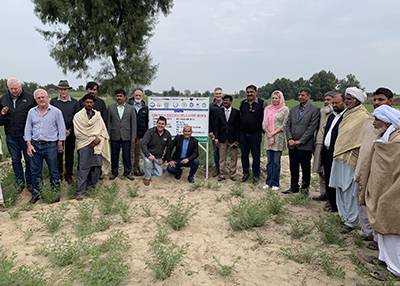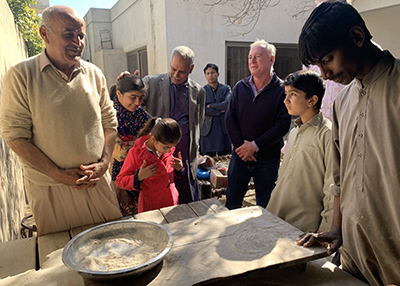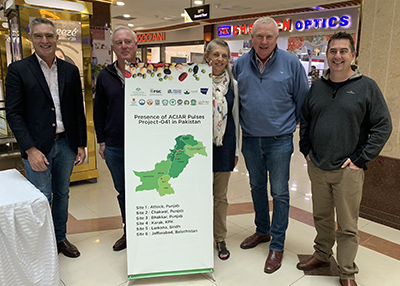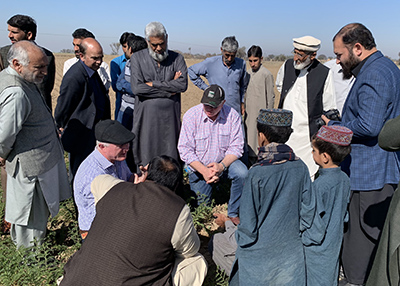FGC celebrating World Pulses Day in Pakistan with three Australian pulse growers
 What better way to recognise World Pulses Day than spending it in Pakistan as part of a tour showcasing FGC research to enhance production of this important crop.
What better way to recognise World Pulses Day than spending it in Pakistan as part of a tour showcasing FGC research to enhance production of this important crop.
The project, funded by the Australian Centre for International Agricultural Research (ACIAR) is working with Pakistani farmers to improve the way lentil, chickpea and groundnut crops are grown.
In February, researchers and three Australian farmers, Andrew Earle, John Minogue and John Bennett travelled to Pakistan as part of the project, attending a chickpea-peanut festival on World Pulses Day and inspecting field trials.
Mr Earle farms at Mungindi on the NSW and Queensland border and says it was valuable to gain a better understanding of pulse production in Pakistan.
 “I was surprised to see that most of the chickpea crop was grown in a much drier region than I was expecting and on poor soil types,” he said.
“I was surprised to see that most of the chickpea crop was grown in a much drier region than I was expecting and on poor soil types,” he said.
“It was interesting to learn that Pakistani growers view the crop as a high risk and are reluctant to spend too much money to improve yields.
“The difference between the prices Pakistani farmers receive for their pulses and the retail price is much greater than I had expected, if the farmers were able to store and market during the year rather than accepting harvest pricing they would be much better off.
“We certainly have some similar agronomic challenges growing chickpeas in Australia.
“For example we also view the crop as being less reliable than the traditional cereals but with improved management we have been able to make the crop more reliable and profitable.
 “The tour also gave me a better understanding of the value of a foreign aid program in terms of maintaining the relationship with Pakistan, which has aspirations of being self-sufficient in pulse production but has major issues with the variable climate.”
“The tour also gave me a better understanding of the value of a foreign aid program in terms of maintaining the relationship with Pakistan, which has aspirations of being self-sufficient in pulse production but has major issues with the variable climate.”
FGC Director Professor Chris Blanchard said, the visit to ACIAR pulse trial sites provided the opportunity to investigate interactions between farmers from two very different systems.
“Despite the language barrier, our Australian Farmers were able to quickly learn from Pakistani farmers about their production systems and discovered that issues facing farmers in Pakistan are similar to those faced by Australian farmers.
“The Australian farmers were able to make several useful recommendations on future experiments the project could explore to assist in improving the profitability of pulse production in Pakistan.”
Mr Earle said a highlight of the trip was a farmer field day near Islamabad.
“We looked at chickpea crops and trials and were able to interact with growers and discuss the rotations.
 “Although there are very big cultural differences we can share the way that farmers and researchers interact to solve problems for growers.
“Although there are very big cultural differences we can share the way that farmers and researchers interact to solve problems for growers.
“Including making sure that farmers are the focus when setting research priorities, rather than just presenting information to farmers,” Mr Earle said.
The project involves a multidisciplinary team of researchers from Charles Sturt University, the Pakistan National Agricultural Research Centre (NARC), provincial research institutes and universities in Pakistan, Pulse Australia and a Riverina farming systems group, Farmlink Research.
- ARC Industrial Transformation Training Centre for Functional Grains
- News
- Newsletter Archive
- 2020
- Issue 1 2020
- FGC celebrating World Pulses Day in Pakistan with three Australian pulse growers


